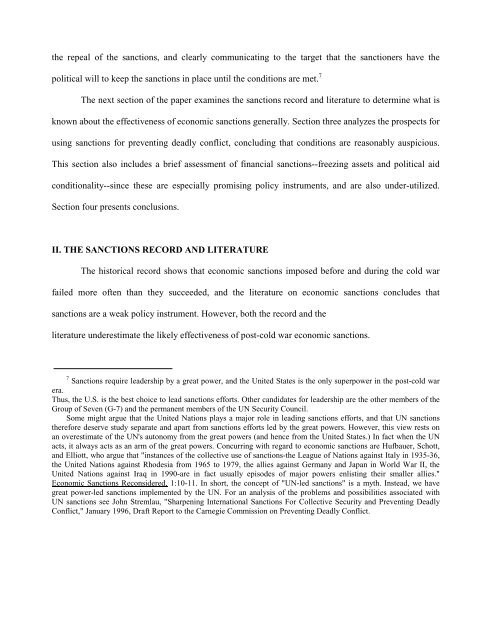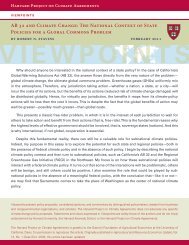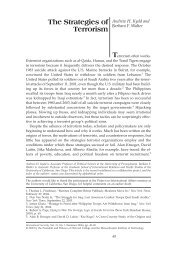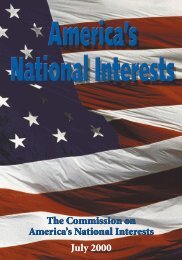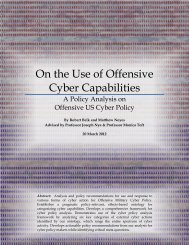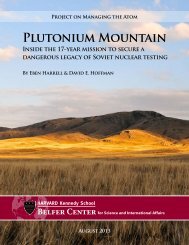Using Economic Sanctions to Prevent Deadly Conflict Elizabeth S ...
Using Economic Sanctions to Prevent Deadly Conflict Elizabeth S ...
Using Economic Sanctions to Prevent Deadly Conflict Elizabeth S ...
You also want an ePaper? Increase the reach of your titles
YUMPU automatically turns print PDFs into web optimized ePapers that Google loves.
the repeal of the sanctions, and clearly communicating <strong>to</strong> the target that the sanctioners have thepolitical will <strong>to</strong> keep the sanctions in place until the conditions are met. 7The next section of the paper examines the sanctions record and literature <strong>to</strong> determine what isknown about the effectiveness of economic sanctions generally. Section three analyzes the prospects forusing sanctions for preventing deadly conflict, concluding that conditions are reasonably auspicious.This section also includes a brief assessment of financial sanctions--freezing assets and political aidconditionality--since these are especially promising policy instruments, and are also under-utilized.Section four presents conclusions.II. THE SANCTIONS RECORD AND LITERATUREThe his<strong>to</strong>rical record shows that economic sanctions imposed before and during the cold warfailed more often than they succeeded, and the literature on economic sanctions concludes thatsanctions are a weak policy instrument. However, both the record and theliterature underestimate the likely effectiveness of post-cold war economic sanctions.7 <strong>Sanctions</strong> require leadership by a great power, and the United States is the only superpower in the post-cold warera.Thus, the U.S. is the best choice <strong>to</strong> lead sanctions efforts. Other candidates for leadership are the other members of theGroup of Seven (G-7) and the permanent members of the UN Security Council.Some might argue that the United Nations plays a major role in leading sanctions efforts, and that UN sanctionstherefore deserve study separate and apart from sanctions efforts led by the great powers. However, this view rests onan overestimate of the UN's au<strong>to</strong>nomy from the great powers (and hence from the United States.) In fact when the UNacts, it always acts as an arm of the great powers. Concurring with regard <strong>to</strong> economic sanctions are Hufbauer, Schott,and Elliott, who argue that "instances of the collective use of sanctions-the League of Nations against Italy in 1935-36,the United Nations against Rhodesia from 1965 <strong>to</strong> 1979, the allies against Germany and Japan in World War II, theUnited Nations against Iraq in 1990-are in fact usually episodes of major powers enlisting their smaller allies."<strong>Economic</strong> <strong>Sanctions</strong> Reconsidered, 1:10-11. In short, the concept of "UN-led sanctions" is a myth. Instead, we havegreat power-led sanctions implemented by the UN. For an analysis of the problems and possibilities associated withUN sanctions see John Stremlau, "Sharpening International <strong>Sanctions</strong> For Collective Security and <strong>Prevent</strong>ing <strong>Deadly</strong><strong>Conflict</strong>," January 1996, Draft Report <strong>to</strong> the Carnegie Commission on <strong>Prevent</strong>ing <strong>Deadly</strong> <strong>Conflict</strong>.


